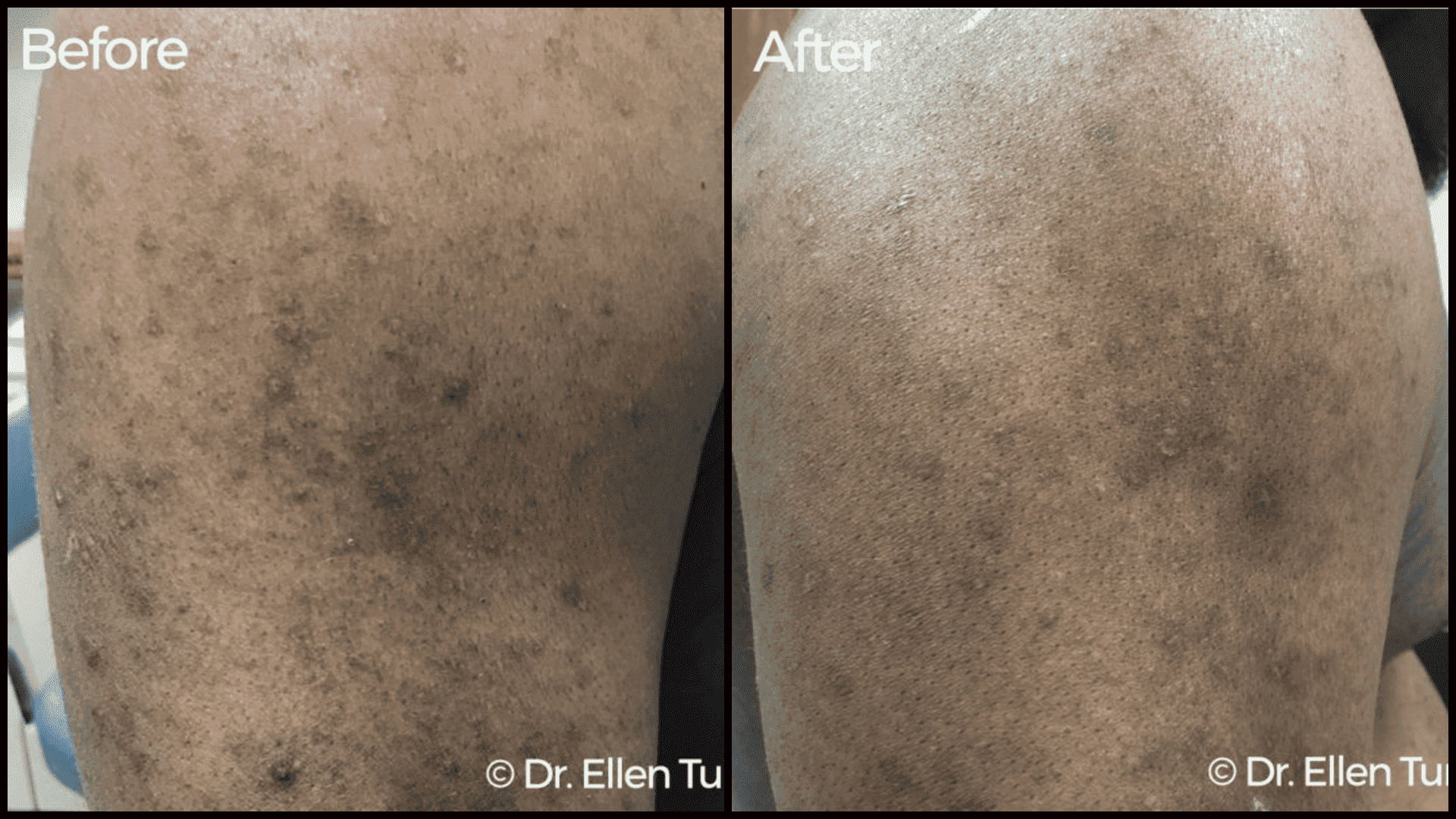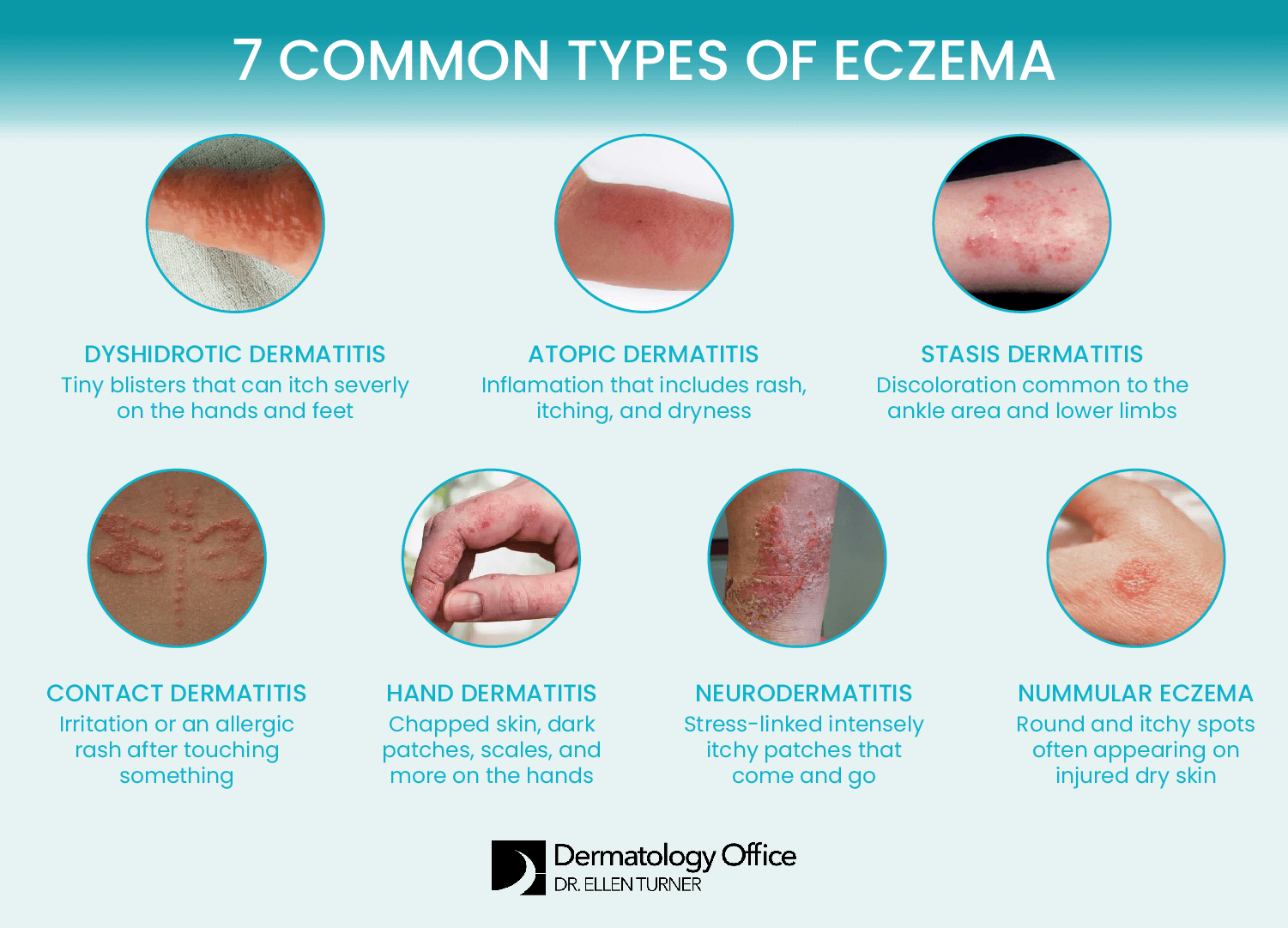Medical Dermatology
Eczema
- Home
- General Dermatology
- Eczema
Eczema/Atopic Dermatitis Description and Treatment
What is eczema?
Eczema is a common skin condition. It is also known as atopic dermatitis and is often described as the “the itch that rashes.” Scratching often leads to redness, swelling, cracking, crusting and scaling of the skin. Intensely itchy patches form and can be located in a few areas, or can be all over the body. Although eczema can be difficult to treat, consulting a licensed dermatologist, such as Dr. Ellen Turner in the Dallas area, is the first step in discovering and implementing a treatment plan to help alleviate symptoms and flare-ups. Dr. Turner will often recommend a combination of therapies and lifestyle changes to help you improve your condition.

Medical Dermatology
Book an appointment online or call (214) 373-7546 to schedule an appointment to see us in our Dallas or Irving locations.
Common Types of Eczema in the Dallas area

Known as “the itch that rashes,” eczema can take many typically uncomfortable forms. It frequently appears as atopic dermatitis, which is irritation that develops on dry skin—often in childhood. Other types include contact dermatitis (itching and rashing in response to touching a trigger), dyshidrotic dermatitis (which involves the hands and feet erupting in tiny, itchy blisters), hand eczema (skin develops a chapped look and texture, red or brown patches, scaling, and other problems), neurodermatitis (intense itching that starts and stops, commonly in response to anxiety or stress), nummular eczema (coin-shaped spots that can itch), and stasis dermatitis (discoloration and visible veins related to insufficient blood flow, often in the lower extremities). For help with eczema in the Dallas area, contact the Dermatology Office.
Common Types of Eczema in the Dallas area
Infantile Eczema
When atopic dermatitis begins during infancy, it is often called infantile eczema. In infants, the itchy patches tend to develop on the scalp and face, especially on the cheeks. When atopic dermatitis develops in an infant or young child, the child tends to get better with time. For some children, the condition completely resolves by age 2 or 3.
Eczema in Adulthood
Eczema can also be a lifelong condition. Fortunately, it tends to become less severe with age. During the teenage and young-adult years, the itchy patches often develop on the elbows and knees. Other common sites for these patches are the hands, feet, ankles, wrists, face, neck and upper chest. Patches are not limited to these areas; they can appear anywhere on the body, including around the eyes and on the eyelids.
Hand Eczema
Having—or having once had—atopic dermatitis increases the risk of developing hand eczema. Some people who see their atopic dermatitis clear during adolescence develop hand eczema as adults.
Hand eczema has many causes. Overexposure to an irritant, an allergic reaction or a fungal infection can cause it. Since having or having had atopic dermatitis tends to leave one with a lifetime of dry, fragile skin, the skin is usually more susceptible to irritants, allergens and fungal infections.
Without proper diagnosis and treatment, hand eczema can become chronic (long lasting), interfering with everyday activities and on-the-job tasks. Treatment involves using medications as directed and making lifestyle changes. Hand eczema can be difficult to treat. For hand eczema to be controlled, patients must continue using the medication as directed and maintain their appointments with their dermatologist.
To lessen the risk of developing hand eczema, dermatologists recommend:
-
- Protecting hands against soaps, cleansers, and other chemicals by wearing gloves. If the gloves irritate your skin, Dr. Turner will give you recommendations for alternatives.
- Using an automatic dishwasher as much as possible.
- Using lukewarm water and very little soap when washing the hands and always applying a dermatologist-recommended ointment or cream immediately after cleansing.
- Keeping hands soft and supple by applying the dermatologist-recommended product frequently throughout the day.
- Wearing gloves to prevent dry, chapped skin when outdoors in cool weather.
Dermatology Office
Meet Dr. Ellen Turner
Dr. Ellen Turner and her staff at the Dermatology Office strive to work within a space where compassion meets technology to obtain top results for Dallas patients.


Questions and Answers: Eczema Triggers and Treatment
Q. Since this condition is associated with allergies, can certain foods be the cause?
A. While foods do not directly cause eczema, several studies suggest that certain foods can worsen it. Some infants and young children with severe atopic dermatitis develop itchy hives and swelling after eating certain foods; these reactions can be dangerous. Some studies show that eliminating the culprits from your diet may lead to dramatic improvements within a short time.
Before eliminating foods from your diet, be sure to discuss the plan with Dr. Turner, a licensed dermatologist. She will use her expertise in this area to help you choose the best options for both your diet and medications. Dr. Turner may also choose to refer you for additional evaluation in combination with an allergist.
Q. Are environmental causes important, and should they be eliminated?
A. Many everyday objects can irritate the skin and cause atopic dermatitis to flare. Wool and other fabrics that feel rough to the touch, juices from meats and fruits, jewelry and even some lotions can worsen atopic dermatitis. Learn what irritates the skin and limit contact with airborne substances that provide little relief for atopic dermatitis but can be important in controlling hay fever and asthma.
Q. What should be done to treat eczema?
A. It is important to consult a licensed dermatologist, such as the Dallas area’s Dr. Turner, as other skin conditions can resemble atopic dermatitis. Without an accurate diagnosis, treatment can be ineffective. If the diagnosis is atopic dermatitis or eczema, Dr. Turner will prescribe an appropriate treatment plan. Medical research continues to show that the most effective treatment plan involves using a combination of therapies to treat the skin and making lifestyle changes to control flare-ups.
An interesting study was performed in eczema patients that revolutionized treatment. The study had two groups of patients: a control group that did not receive treatment, and a second study group that received treatment. The study looked at what would happen if ½ cup of plain household bleach was poured into a full bathtub of water three times per week. The control group did not use any bleach. The results were so positive for patients in the bleach bath treatment group that the researchers had to switch all of the patients into the study group for ethical reasons. The bleach bath group had a significant decrease in the number of eczema flares they experienced, thus requiring much less medical treatment, such as topical steroids or even oral steroids and antihistamines. Plus, the cost of the treatment was so minimal. A ½ cup of bleach costs pennies on the dollar.
Dermatologists around the country immediately began to incorporate bleach bathing into the skincare regimen of their eczema patients. The study highlighted an important point: the positive bleach bathing results proved that the higher levels of naturally occurring bacteria on the skin were somehow worsening or exacerbating the eczema flares. By using the bleach bath, the naturally occurring bacterial counts were reduced significantly, resulting in fewer eczema flares.
No matter what, all eczema patients should hydrate their skin daily, especially immediately following bleach bathing, in order to seal in the moisture. Daily hydration is mandatory. If patients skip even one day of hydration using a cream-based—not lotion-based—moisturizer, they risk an eczema flare. Thus, daily moisturizing is a mainstay of treatment. Other treatments include topical and oral steroids and antihistamines and sometimes keratolytic agents that can smooth the skin in areas where it is more rough and scaly.
If you have another atopic disease, such as hay fever or asthma, Dr. Turner can refer you to an allergist for testing. Since Dr. Turner focuses on outstanding patient care, you can be assured that she will listen to your concerns and work with you to choose an appropriate therapy or therapies. Come in for a comfortable, informative and respectful consultation. To schedule an appointment with Dr. Turner to discuss eczema and therapeutic options, you can book an appointment online or call the office at (214) 373-7546.
How much does eczema treatment cost?
Treatment costs will vary depending on the scope and duration of the specific course of action Dr. Turner recommends.

